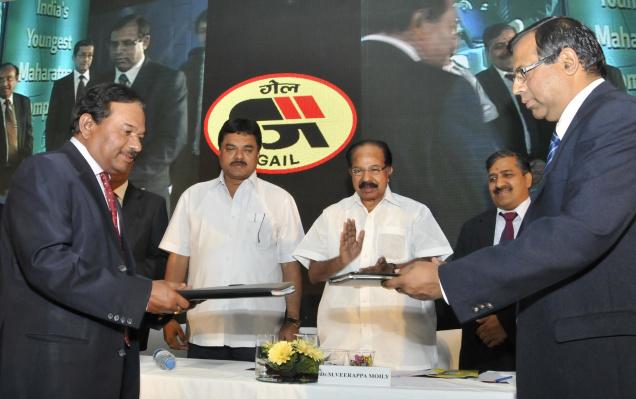
Bangalore, Feb 19: Bangaloreans on Monday came a step closer to having piped gas connections at their houses, with the State-owned Gas Authority of India Limited (Gail) formally commissioning the 1,000-km Dabhol-Bangalore gas pipeline project.
The first volume of gas arrived at Bidadi from the recently operationalised liquefied natural gas (LNG) terminal at Dabhol in Maharashtra. Bangalore may be the next destination, although it will take over six months for the pipeline distribution network in the City to be ready.
The supply at Bidadi was meant for Toyota Kirloskar Auto Parts Pvt Limited, Gail’s first customer after an MoU was signed earlier. Toyota will use the gas for captive power generation. Karnataka Power Corporation Limited (KPCL) became Gail’s second customer on Monday. Gail signed an agreement to supply 0.6 million tonnes of LNG to KPCL’s proposed 1,400 MW power plant at Bidadi.
The first phase of the project, with a capacity of 750 MW, will be built in the next two to two and a half years at an estimated cost of Rs 2,800 crore, said M R Kamble, KPCL?Managing Director. About 170 acres was acquired for the project and all clearances obtained. Bangalore Water Supply and Sewerage Board (BWSSB) will supply water to the unit.
With 1,400 MW from the upcoming Bidadi power plant, Bangalore will have a captive power generation capacity of 1,750 MW as against a demand for 1,500 MW, Kamble said. The pipeline gas will also help the government save costs at the 350 MW Yelahanka power plant by using gas as its fuel.
Eventually, the Rs 4,500 crore Dabhol-Bangalore pipeline project will benefit households and road transport, besides boosting power generation for Bangalore. It will also cater to industries in Belgaum, Dharwad, Gadag, Bellary, Davanagere, Chitradurga, Tumkur and Ramanagaram.
Maharashtra and Goa will also benefit from the 1,000-km pipeline, which passes through these states.
Inaugurating the project, Union Minister for Petroleum and Natural Gas M Veerappa Moily described the initiative as a “game changer” for the City. “With the gas coming in, the devil of pollution will disappear from the garden city,” he added.
The pipeline will be extended to Mangalore and then to Kochi in Kerala by next year. Karnataka can save power generation costs by Rs 800 crore annually.
There will also be improvement in power efficiency and the clean energy will cut down pollution caused by the existing liquid fuels, Moily said.
However, households in the City will have to wait for at least six months. A senior Karnataka State Industrial and Infrastructure Development Corporation official said the corporation has signed an MoU with Gail to establish a piped gas network for Bangalore and other cities in Karnataka.
“We are preparing a business plan for setting up piped gas network, which will go before the Petroleum and Natural Gas Regulatory Board. If we get the licence soon, the first phase of the network for Bangalore can be set up within six months,” he said.
Moily said 73 km of the gas pipeline has already been laid in the City, most of it passing through Outer Ring Road. The state government should accelerate works to set up a pipeline network and feeders in the City so that compressed natural gas (CNG) supply for automobiles and piped cooking gas supply for households can begin.
Gail could get the licence for operating gas units here to supply CNG for automobiles.
“To start with, four such units can be started in the City and the first CNG?station might come up in two months,” he said. However, modifications need to made to the vehicle engines to make use of the facility, Moily added.
B C Tripathi, Chairman and Managing Director, Gail, said the company had imported two shiploads of LNG at Dabhol and a third would be imported within 10 days.
Gail has also signed agreements with Jindal Aluminium Ltd and Indian Petrochemical Corporation Ltd for LNG supply.








Comments
Add new comment